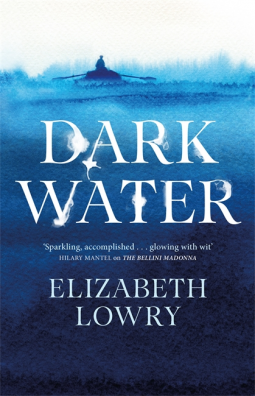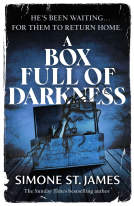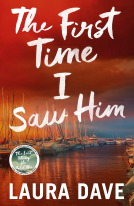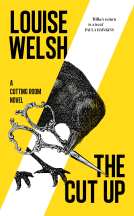
Dark Water
Longlisted for the Walter Scott Prize for Historical Fiction
by Elizabeth Lowry
This title was previously available on NetGalley and is now archived.
Send NetGalley books directly to your Kindle or Kindle app
1
To read on a Kindle or Kindle app, please add kindle@netgalley.com as an approved email address to receive files in your Amazon account. Click here for step-by-step instructions.
2
Also find your Kindle email address within your Amazon account, and enter it here.
Pub Date 6 Sep 2018 | Archive Date 6 Sep 2018
Quercus Books | riverrun
Talking about this book? Use #DarkWater #NetGalley. More hashtag tips!
Description
Longlisted for the Walter Scott Prize for Historical Fiction
'Eloquent, impressive . . . while her touch is witty, her manner almost buoyant, her themes are sinister beyond belief. She touches the frontiers of the human' Hilary Mantel
Boston, 1833
Aboard the USS Orbis as it embarks from Boston and surges south to round Cape Horn, Hiram Carver takes up his first position as ship's doctor. Callow and anxious among the seasoned sailors, he struggles in this brutal floating world until he meets William Borden.
Borden. The Hero of the Providence. A legend among sailors, his presence hypnotizes Carver, even before he hears the man's story. Years before, Borden saved several men from mutiny and led them in a dinghy across the Pacific to safety.
Every ship faces terror from the deep. What happens on the Orbis binds Carver and Borden together forever. When Carver recovers, and takes up a role at Boston's Asylum for the Insane, he will meet Borden again - broken, starving, overwhelmed by the madness that has shadowed him ever since he sailed on the Providence.
Carver devotes himself to Borden's cure, sure it depends on drawing out the truth about that terrible voyage. But though he raises up monsters, they will not rest. So Carver must return once more to the edge of the sea and confront the man - and the myth - that lie in dark water.
Elizabeth Lowry's gothic masterpiece, like Golden Hill and The Essex Serpent, gives the historical novel a new, beating heart. In Carver and Borden, she realizes the dichotomy of savagery and reason, of man and monster, of life and sacrifice, in a tale rich with adventure and glorious imagination.
Advance Praise
‘Remarkable, powerful, at once realist and heightened, gothic, mythic, with sudden flashes of humour. It is a page-turner, a powerful re-invigoration of the historical novel, weighted with multiple resonances of Moby Dick, Mutiny on the Bounty and The Ancient Mariner’ – Andrew Greig
Available Editions
| EDITION | Other Format |
| ISBN | 9781786485625 |
| PRICE | £16.99 (GBP) |
| PAGES | 480 |
Average rating from 14 members
Featured Reviews
 Reviewer 477318
Reviewer 477318
Powerful in its imagery and terrifying in its acute observation of obsession, few novels probe the depths of memory, the mind and the unfathomable ocean itself as well as Elizabeth Lowry’s Dark Water.
Hiram Carver, once assistant surgeon on the ship the USS Orbis and now alienist at the Asylum for the Insane in Charlestown, Boston, finds himself recollecting his memories of that strange and distressing voyage. Foremost within his thoughts is William Borden, the watchful, inscrutable Third Lieutenant, famous for saving the captain of the USS Providence from violent mutiny, and for guiding their dinghy across the ocean to safety. But such heroic deeds have bitter consequences, as Carver will soon discover: from the Orbis to the asylum, and then to Nantucket’s windy, wild shores, the ties that bind him to Borden and to the events of that fateful voyage will come to define his own actions…
Unsettling from its opening pages, Lowry’s novel excels in its exploration of the human psyche, of the relations we establish with others, and in its very depiction of the “dark water” which forms our own consciences. The descriptions offered of first the ship and then the asylum are claustrophobic and ominous, the crashing ocean outside a shattering reminder of the fragile veneers of society and sanity. Nowhere is this pretence more exposed than on the Orbis, with its distorted imitation of social hierarchy offering glimpses of the chaos lying underneath.
It is this possibility, this potential for chaos which Lowry harnesses so well in the novel, and which gives the story its gothic aspect. The image of the sea evokes this vast, nameless fear: full is the suggestion that malevolent shapes lurk not only beneath the waves, but appear on dry land, too. It is in Carver’s attempts to understand Borden, and indeed to comprehend his own instinctual need for the man, that we slowly become aware of the base hungers that lie coiled within both characters. There is the torture of the unknown, whether it be at sea or in the bottomless reaches of the mind, and the greater torment of being so wholly attracted to it.
Though it is Hiram Carver who leads us through the novel’s intriguing plot, it is perhaps William Borden who most attracts the reader’s attention. Like Carver, we are caught between his strangeness and charm, and we remain enthralled to the enduring mystery of what really happened on that small dinghy cast adrift in the Pacific.
But it is the twisting, spiralling friendship between the two men which is the novel’s greatest appeal, as is their own definition of such a relationship; the light in which Carver views Borden throws into harsh relief the disconnect separating what a person is and the roles our own selfish desires can cast them in. Part of the story’s thrill lies in Carver’s attempt to restore human sensibility to a man he sees only as a god – replete with the power to master the ocean – while it is Lowry’s sinuous prose which lends pace to the quest.
Like the very best books, Dark Water forces us as readers to guess at what lies below the surface, whether it be a character’s true motives or the truth behind supposedly heroic deeds. Confronted as we are by characters ensnared within their own delusions, we too are held captive by this beautifully-written novel; though, as the poet Dylan Thomas would have it, we “sing in our chains like the sea.”
(Thank you so much to Quercus Books and riverrun for offering me the chance to review this book; I received a free copy through NetGalley for an honest review).
Readers who liked this book also liked:
Robert Thorogood
General Fiction (Adult), Mystery & Thrillers, Women's Fiction


















